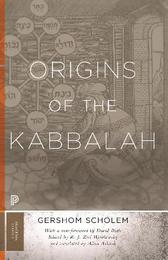
|
Origins of the Kabbalah
Paperback / softback
Main Details
| Title |
Origins of the Kabbalah
|
| Authors and Contributors |
By (author) Gershom Gerhard Scholem
|
|
Foreword by David Biale
|
|
Edited by R. J. Zwi Werblowsky
|
|
Translated by Allan Arkush
|
| Series | Princeton Classics |
|---|
| Physical Properties |
| Format:Paperback / softback | | Pages:512 | | Dimensions(mm): Height 216,Width 140 |
|
| Category/Genre | Judaism - mysticism |
|---|
| ISBN/Barcode |
9780691182988
|
| Classifications | Dewey:296.16 |
|---|
| Audience | |
|---|
|
Publishing Details |
| Publisher |
Princeton University Press
|
| Imprint |
Princeton University Press
|
| Publication Date |
26 February 2019 |
| Publication Country |
United States
|
Description
With the publication of The Origins of the Kabbalah in 1950, one of the most important scholars of our century brought the obscure world of Jewish mysticism to a wider audience for the first time. A crucial work in the oeuvre of Gershom Scholem, this book details the beginnings of the Kabbalah in twelfth- and thirteenth-century southern France and
Author Biography
Gershom Scholem (1897-1982) was a German-born Israeli philosopher and historian. He was professor of Jewish mysticism at Hebrew University of Jerusalem. David Biale is the Emanuel Ringelblum Distinguished Professor of Jewish History at the University of California, Davis. He is the author of Gershom Scholem: Master of the Kabbalah.
Reviews"No great textual scholar, no master of philology and historical criticism commands a technique at once more scrupulously attentive to its object and more instinctive with the writer's voice [than Scholem]. That voice reaches out and grabs the layman."-George Steiner, New Yorker "[Scholem's] work on Jewish mysticism, messianism, and sectarianism, spanning now half a century, constitutes ... one of the major achievements of the historical imagination in our time. I would contend that it is of vital interest not only to anyone concerned with the history of religion but to anyone struggling to understand the underlying problematics of the human predicament."-Robert Alter, Commentary "This book has been a classic in its field since it was first issued in 1950, and it still stands as uniquely authoritative and intriguingly instructive.... [It is] a monument of revelation and insight bridging anthropology, religion, sociology, and history."-Publishers Weekly
|